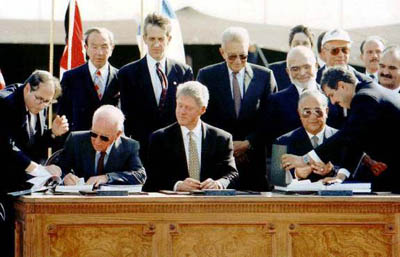Neboroskiev Accords
| Agreement on Ending the War and Restoring Peace in Vulkaria | |
|---|---|
 Dignataries of C.C.A. nations and the Malvarian Alliance signing the treaty | |
| Type | Peace treaty |
| Drafted | January 4th, 2005 |
| Signed | February 6th, 2005 |
| Location | Neboroskiev, Beleroskov |
| Mediators | President Nikolai Ubotrov |
| Parties | Coalition of Crown Albatross
Malvarian Alliance |
The Neboroskiev Accords, officially titled the Agreement on Ending the War and Restoring Peace in Vulkaria, was a peace treaty signed on February 6th, 2005 in Neboroskiev, Beleroskov, to establish peace in Vulkaria and end the Second War in Vulkaria. The treaty included the governments of Vulkaria, Zamastan, Cadair, Emmiria, Rio Palito, and Quetana, as well as the Government of Elastan; which represented rebel forces such as the Malvarian Liberation Front; and Ossinia; which supplied mercenary forces.
Background
Since 1982, Vulkaria had been in a constant state of turmoil, unrest, and conflict along political and ethnic lines, with the main belligerents being the Vulkarian government and the Malvarian Liberation Front, a rebel organization propped up by the Elastani government and deemed a terrorist group by many nations. The tensions culminated in two devestating wars; the First War in Vulkaria and the Second War in Vulkaria. By winter of 2004, the Vulkarian government and Coalition of Crown Albatross peacekeeping force supporting them were exhausted, and the M.L.F., sponsored by the Ossinian regime of Martin Saint-Yves, were also quickly depleting their supplies for fighting. In an attempt to make peace, former Secretary-General of the C.C.A. and future-President Farhen Brooks met with representatives of the Beleroskovian government who agreed to negotiate a peace deal with the M.L.F. Peace terms were agreed to, and the two parties agreed to meet in Neboroskiev in February 2005 to officially end hostilities.
Provisions and negotiations
The accords solidified the surrender of the majority of insurgent forces and allowed capitulated rebel conscripts unobstructed access to flee to Elastan, Joraistan, and Salubar. Samuel Kannit, the leader of the M.L.F., was captured by Zamastanian forces three weeks before the accords and was sent to Vongane, Quetana, for the Vongane Trials, leading to the near collapse of the negotiations. However, Zamastanian President Cassious Castovia agreed to the original proposal, saying "we keep Kannit, the rest of you can go home." The representatives of the M.L.F. agreed to the results, leading future M.L.F.-commander Van'a Kamoni to later write in a personal note about his anger regarding the situation: "This is the biggest betrayal of my people, and it comes from my people's desire to live at the cost of surrender. I will never surrender."